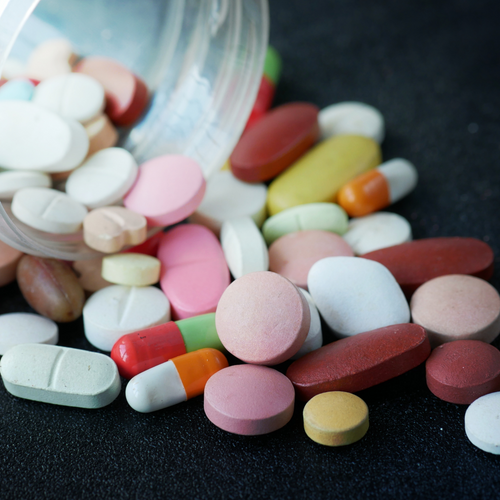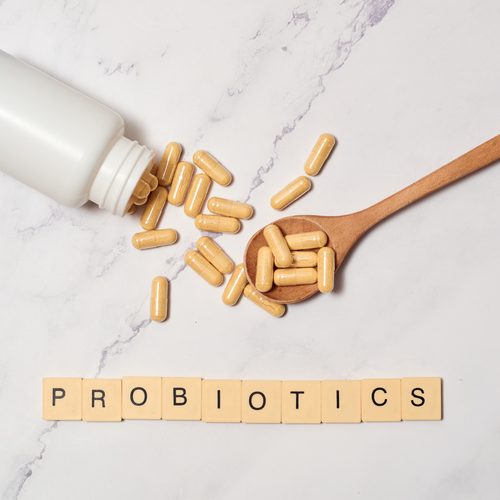What to remember:
- Endometriosis is a chronic disease that causes inflammation in the body.
- It is a pathology responsible for severe pelvic pain, but also other symptoms that are generally less well-known, such as digestive discomfort.
- There are various natural solutions that can help you fight pain and learn to manage your emotions.
- Providing the right dietary supplements can help relieve some symptoms of this condition.
What is endometriosis?
First described in 1860, endometriosis is a chronic, debilitating condition affecting up to 10% of women of childbearing age. The exact origin of this disease remains poorly understood. This disease is characterized by the growth and migration of endometrial-like tissue outside the uterus, the organ in which it usually grows. The growth of this tissue can cause lesions, adhesions between organs, i.e., tissue sticking together, and inflammation in the body. This disease manifests itself in different forms and can affect different organs, such as the ovaries, bladder, vagina, rectum, etc. Each type of endometriosis is unique; we more commonly refer to it as “endometriosis.” It is a disease that significantly affects quality of life.
What are the main symptoms of endometriosis?
The main symptoms of endometriosis vary from person to person. They most often appear during adolescence and evolve according to the woman's menstrual cycles.
We mainly find:
- Chronic pelvic pain , i.e. located below the navel, and occurring in 86% of cases.
- Dysmenorrhea , or severe pain triggered during menstruation , is reported in 75 to 90% of cases.
- Dyspareunia , or pain during sexual intercourse, occurs in 30 to 70% of cases.
- Chronic fatigue
- Infertility , a sign sometimes highlighting the presence of the disease, in the case of an asymptomatic person. This is encountered in 30 to 40% of people who are affected. Even today, the cause of infertility encountered during endometriosis is still not elucidated.
What are some other lesser-known symptoms of endometriosis?
Other symptoms are found in certain cases, and are less well known, among them:
- Digestive problems (35% affected at the intestinal level), such as diarrhea or constipation , or even an alternation of the two, abdominal pain, bloating , nausea, vomiting. These symptoms may only be present during menstruation, or even worse at this time of the cycle. In the context of so-called “rectal” endometriosis, some women may also experience significant pain when passing stools, and even particularly during menstruation.
- Urinary problems (23% affected at the bladder level)
Most often, these disorders are related to the bladder. Urinary symptoms include difficulty and/or pain when urinating, increased urination (the act of urinating), urinary urgency, possibly accompanied by urinary incontinence, and hematuria, i.e., the presence of blood in the urine.
- Lower back pain 66%
- Sleep disorders linked to repeated pain
- Emotional disturbances (62%, anxiety, increased sensitivity)
How to treat the symptoms of endometriosis?
1 - Consult a doctor
In the context of this pathology, it is important to seek the advice of a doctor and specialists in the disease, to find the most appropriate medical treatment, and to monitor the progress of the disease.
2 - Adopt an anti-inflammatory diet
Adjusting your diet can help prevent and reduce inflammation generated in the intestines.
So, adopting this diet , firstly, means limiting excesses, that is to say avoiding eating too much fat, too much sugar , too much salt, and too much acid . Then, secondly, favor the consumption of fiber , antioxidants, vitamins and omega-3. These are mainly found in whole grains, fruits and vegetables, legumes, oily fish (salmon, mackerel, sardines, etc.), vegetable oils (particularly rapeseed, flax, hemp and walnut oils), and oilseeds.
As part of optimal intestinal health , the consumption of fermented foods such as sauerkraut or yogurts provides probiotics to the intestinal microbiota, and thus modulate the inflammation generated in the intestines .
Finally, consuming mild spices like turmeric has anti-inflammatory properties. It reduces the production of pro-inflammatory substances produced by immune system cells and decreases the expression of enzymes that play a role in inflammation.
3 - Learn to manage your emotions
Studies tend to show that endometriosis increases the level of anxiety and depression . Learning to manage one's emotions is therefore essential in the context of endometriosis.
With this in mind, various methods exist.
#1 - Mindful eating
This advice may seem trivial, but it is often neglected in our modern lifestyles.
Mindful eating involves being fully present and aware during mealtimes. During these times, we witness the sensations, thoughts, and emotions that the act of eating arouses in us.
When we eat mindfully, we understand and respect our body's needs, which will have the benefit of reducing stress .
It is therefore recommended to eat while sitting down, in a calm environment, for a period of 20 minutes, the time needed to feel full. We should also be careful to eat when we feel hungry, and to stop when we feel “satisfied”, and not “full”.
#2 - Relaxation, sophrology, hypnosis
These three techniques aim to improve stress management, relaxation and general well-being .
Relaxation allows for total release through deep breathing, visualization techniques (soothing places or moments), muscle relaxation, and meditation.
Sophrology will also allow relaxation, an improvement in stress and emotion management , while also ensuring that the ability to concentrate and self-confidence are strengthened.
Hypnosis, whether performed by a third party or by oneself, is a state of altered consciousness, which, when practiced in the health field, allows for better management of pain, anxiety disorders, and stress. This type of state allows a person's reality to be changed through the unconscious, making it more likely to accept certain suggestions and/or changes.
#3 - Acupuncture
This technique, originating from traditional Chinese medicine, uses fine needles to rebalance the flow of energy circulating in the body.
It helps reduce the perception of pain, which has a significant impact in the context of endometriosis, reduces the inflammation generated, improves blood circulation , particularly in the pelvis, and balances the hormone levels of the menstrual cycle.
4 - Practice appropriate physical activity
Physical activity also has an impact on pain reduction because it triggers the release of endorphins, the happy hormones, which reduce pain (analgesic action of endorphins). The release of these hormones, as well as that of serotonin, improves mood and general well-being.
The practice of yoga is now widely known for reducing stress, decreasing muscle tension, and promoting relaxation. With this in mind, yin yoga features gentle postures held for 2-3 minutes to lead to complete relaxation.
5 - Heat
Applying heat increases vasodilation of blood vessels, and thus oxygen delivery. It will have a relaxing effect on the muscles, thus relieving muscle spasms that occur in endometriosis. This effect will have the benefit of relieving the pain felt.
Applying a hot water bottle or taking a warm bath can help relieve chronic pain caused by endometriosis.
Sources:
[1] Rosenbaum, J., Bourdel, N., Khochbin, S., Kvaskoff, M., Matsuzaki, S., Mechta-Grigoriou, F., ... & Vaiman, D. (2022). Avenues for reflection for research on endometriosis in France. medicine/sciences , 38 (3), 274-279.[2] Dupas, C., & Christin-Maitre, S. (2008, September). What's new on endometriosis?. In Annals of Endocrinology (Vol. 69, pp. S53-S56). Elsevier Masson.
[3] Chapron, C., & Candau, Y. (2018). Misconceptions about endometriosis . The Blue Rider.
[4] Koller, D., Pathak, GA, Wendt, FR, Tylee, DS, Levey, DF, Overstreet, C., Gelernter, J., Taylor, HS, & Polimanti, R. (2023). Epidemiologic and Genetic Associations of Endometriosis With Depression, Anxiety, and Eating Disorders. JAMA network open , 6 (1), e2251214. https://doi.org/10.1001/jamanetworkopen.2022.51214
[5] Li, PS, Peng, XM, Niu, XX, Xu, L., Ng, EHY, Wang, CC, ... & Liang, RN (2023). Efficacy of acupuncture for endometriosis-associated pain: a multicenter randomized single-blind placebo-controlled trial. Fertility and Sterility , 119 (5), 815-823.














